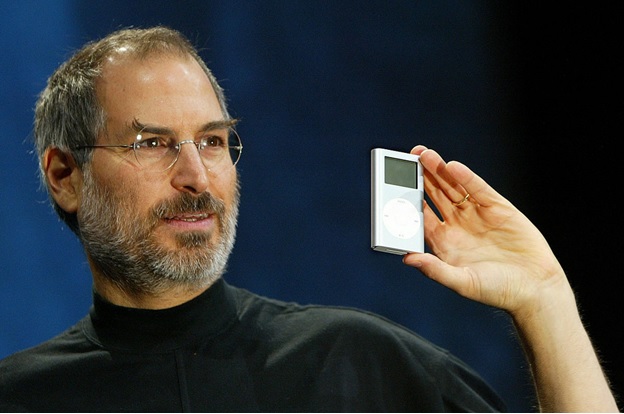
Photo:; Apple
Have you checked the price of Apple stock lately? Over the holiday, their stock hit an all-time high – an amazing accomplishment that’s been over-performing in the market for well more than two decades now.
In the “shoulda, coulda, woulda” department, if you had purchased $1,000 in Apple stock in 1997 when Steve Jobs returned to the company he cofounded, that modest investment would be worth north of $1.8 million today (assuming you had reinvested all the dividends along the way).
You can see the trajectory of the stock known as AAPL on the NASDAQ stock exchange on the handy chart below:

Despite its insane return on investment, Apple’s been under a great deal of criticism in recent years for a lack of innovative, breakthrough products. iPhone improvements are now incremental, unlike the wild and wooly years when these incredible devices were newly launched by the Cupertino team.
 When you think about Apple’s tech progress especially since the passing of their mercurial visionary, Steve Jobs, it’s not all that impressive. Their Watch is successful, but has failed to go mass market. Apple fell behind in voice, and is now light years behind Amazon and Google in the smart speaker sweepstakes. Its expensive HomePod has failed to win over consumers.
When you think about Apple’s tech progress especially since the passing of their mercurial visionary, Steve Jobs, it’s not all that impressive. Their Watch is successful, but has failed to go mass market. Apple fell behind in voice, and is now light years behind Amazon and Google in the smart speaker sweepstakes. Its expensive HomePod has failed to win over consumers.

Photo: Apple
After years of speculation, they never got that highly rumored Apple Car off the drawing board and on the road. And their attempt at creating “the next big thing” with their Vision Pro headset launched earlier this year has woefully fallen well short of goal.
But it is AI where you glaringly see the effect of Apple’s technology lag. While other players – especially Microsoft – have been highly proactive in AI development and investment, Apple’s slow poke pace is something of a head scratcher.
Some may argue it’s not all that novel in the post-Jobs era. The company has a history on improving on existing products rather than inventing them from scratch. Remember that Apple didn’t invent the mp3 player or the smartphone, but they did come up with arguably the best, most innovative, and most wildly successful versions of each.
 So when the company rolled out its own version of AI at their Worldwide Developers Conference last month, the skeptics as well as their fan boys (and girls) came out in force, to both praise and castigate Apple’s strategy and tactics.
So when the company rolled out its own version of AI at their Worldwide Developers Conference last month, the skeptics as well as their fan boys (and girls) came out in force, to both praise and castigate Apple’s strategy and tactics.
Like so many Apple moves over the past many decades, you have to give them credit for packaging and marketing. Their play on the AI acronym – Apple Intelligence – is absolutely brilliant. It is a mechanism to persuade us their version of artificial intelligence may be the best version yet, and is typical of the way Apple has been known to co-opt innovation.
In reality, Apple’s play on AI is once again highly derivative. The artificial intelligence that will be baked into the next iteration of their iOS platform will, in fact, flow from a deal struck with OpenAI, the geniuses behind ChatGPT .
Apple CEO Tim Cook‘s announcement was the basic PR tweet, celebrating the arrival of Apple Intelligence. While that news didn’t exactly blow away most techies, it sure rankled Elon Musk who has had his issues with OpenAI. Not surprisingly, he started a rant on Twitter, a reactionary response to his “take” on Apple’s partnership. And it ended with an ominous threat in typical Musk style:
Don’t want it.
Either stop this creepy spyware or all Apple devices will be banned from the premises of my companies.
— Elon Musk (@elonmusk) June 10, 2024
How many CEOs would have read Musk’s missive and called a crisis management team meeting? After all, when the CEO of Tesla, SpaceX, and Twitter/X threatens to ban your mobile phones and tablets throughout his many companies, it’s “a thing.”
And as you may recall when this news broke, it was all over cable news, social media, and the entire Internet. After all, when you get trolled by the infamous Elon Musk, it’s a big deal.
Except to Cook.
A recent opinion piece in Inc. from Jason Aten made the case Cook’s “non-reaction” may have made the difference in tempering Musk, and perhaps discouraging him from raving on.
As Aten points out, unless there was unpublicized interaction between these two moguls, it appears Cook’s response to Musk was not to react to him at all.
When companies or individuals deal with trolls online, especially in social media where things can go off the rail in a hurry, the temptation is to explain, respond, defend, and in many cases, attack back.
Cook plays it differently. By letting Musk’s comments pass and allowing cooler heads to prevail, Apple’s CEO employed some emotional intelligence by not overreacting and taking the bait.
 We’ve endured a decade-long period where trolls are the norm, where attackers keep hurling online assaults, always doubling down on their attacks. As Aten notes, Cook’s M.O. is to let the emotional attack blow over:
We’ve endured a decade-long period where trolls are the norm, where attackers keep hurling online assaults, always doubling down on their attacks. As Aten notes, Cook’s M.O. is to let the emotional attack blow over:
“There’s nothing to gain from shooting back on social media, especially if you’re dealing with someone who thrives on exactly that sort of thing.”
I saw this unfold – a lot – when Lori Lewis first joined our company. Social media trolls were just ramping up back then. Lori’s job was to counsel radio stations on how to deal with negative social feedback. Do you respond, ignore, or delete?
As we learned, when you put yourself out there, not everyone’s going to be happy about it. They’ll project, name call, and attack. How you cope with that level of criticism says a lot about who you are as a leader.
Web attacks run the gamut, often reflecting the unhappy personality of the aggressor. Their unhappiness manifests itself in many different forms. As Tim Cook knows, disarming their attacks is often the beginning of a positive shift in an angry exchange. Most of us aren’t psychologists – especially me – but it is possible to learn the frustrations of your adversaries in order to parry the impact of the attacker.
Unlike Aten, I’m not so sure every assault deserves a “zero sum response.” But in the case of Musk, where much of the attack’s motivation was to force a defensive reaction, Cook’s non-response is the smart move.

But when you’re simply attacked by someone volatile and temperamental for no particular reason, Tim Cook’s measured response is worth emulating.
There are frustrated armies of people, especially on social media, who have come to believe they can post pretty much anything without having to prove, justify, or explain it.
Trolls aren’t the least bit cute, nor are they usually worth your energy or your time. Reasoning with the terminally unhappy is rarely a productive use of that time.

Tim Cook knows. Ignore ’em and even the loudest and most influential bully will likely go away if you don’t respond to them.
Especially the guy who owns Twitter/X.
Originally published by Jacobs Media








